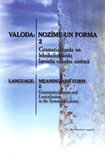Heterotoni un vārda nozīmes uztvere
Heterotonic Words and the Perception of the Word (Lexical) Meaning
Author(s): Juris GrigorjevsSubject(s): Language and Literature Studies, Semiotics / Semiology, Theoretical Linguistics, Semantics, Baltic Languages
Published by: Latvijas Universitātes Akadēmiskais apgāds
Keywords: heterotons; zilbes intonācija; vārda nozīme; uztveres eksperiments;
Summary/Abstract: It is widely known that in Latvian the tonal modulation of the long syllable can be the only determinant of a word’s meaning if a homophone is pronounced in isolation, i.e., without contextual information. This article briefly covers two topics – 1) correlation between the word meaning and its tonal modulation on the root syllable, 2) correlation between the tonal modulation of a heterotonic word with the contextual information about the meaning of that word provided by the sentence. The conclusions are drawn from the results obtained for the group of respondents representing speakers of the two-tone system (drawn vs. non-drawn) of the Standard Latvian. It has been observed that the results from relating the tonal modulation of a word root to its meaning – with speakers distinguishing the drawn (also called – level) tone from the falling and the broken one (i.e., non-drawn) - strongly depended upon the word used in the experiment, whereas the words widely used in everyday speech have scored best. Expectedly, distinguishing the falling tonal modulation from the broken one was the most difficult task for this group of respondents and resulted in many wrong answers.The second part of the experiment revealed that the perception of the tonal modulation appropriate for the given context was in some cases far better than associating the tonal modulation with the meaning of the word. From this it follows that even though the tonal modulation for at least half of the words used in this experiment has been perceived correctly and the respondents are familiar with it, they still have difficulties associating a particular tone with the right meaning.
Journal: Valoda: nozīme un forma
- Issue Year: 2012
- Issue No: 2
- Page Range: 68-74
- Page Count: 7
- Language: Latvian

